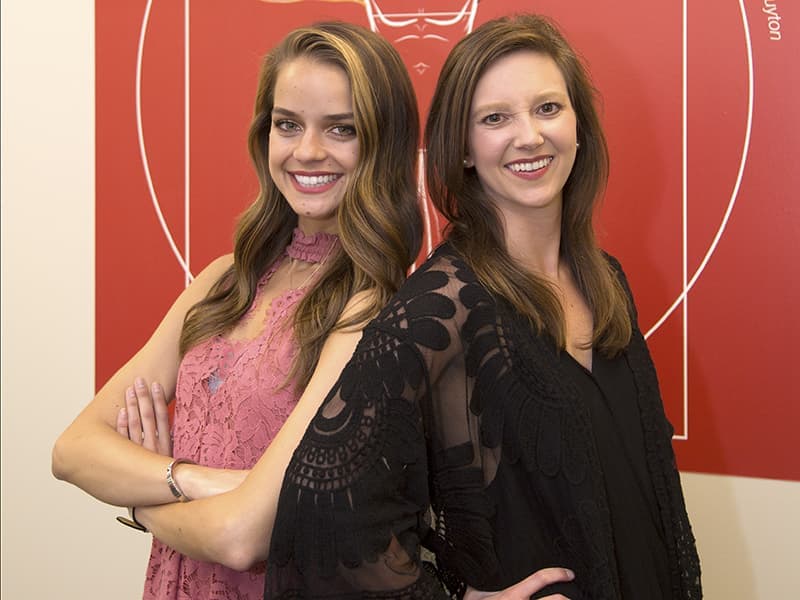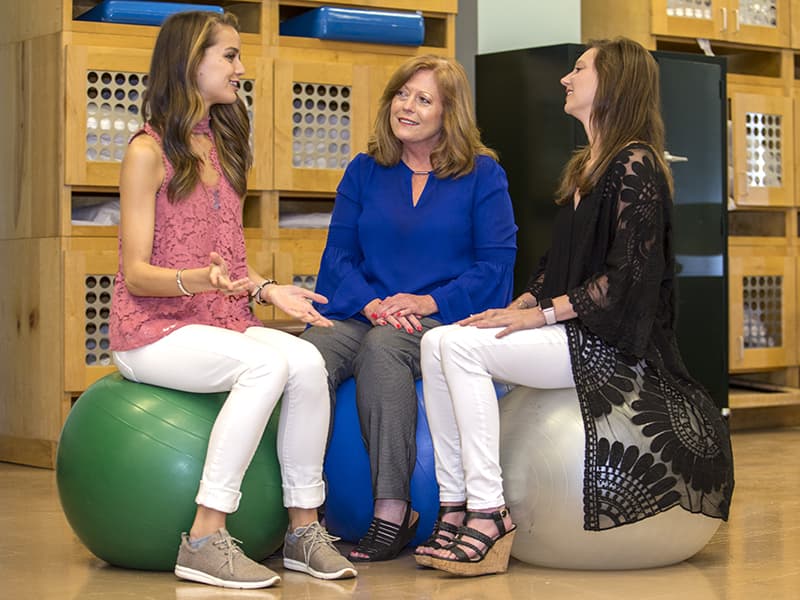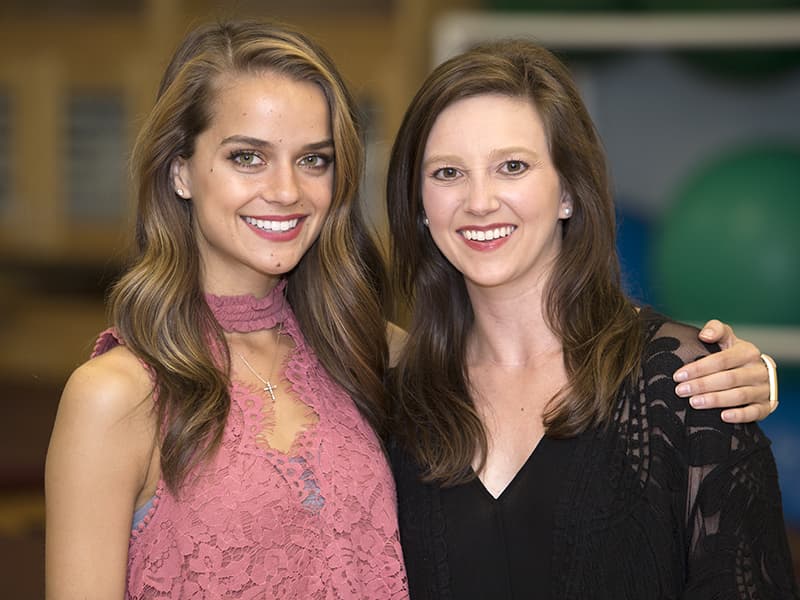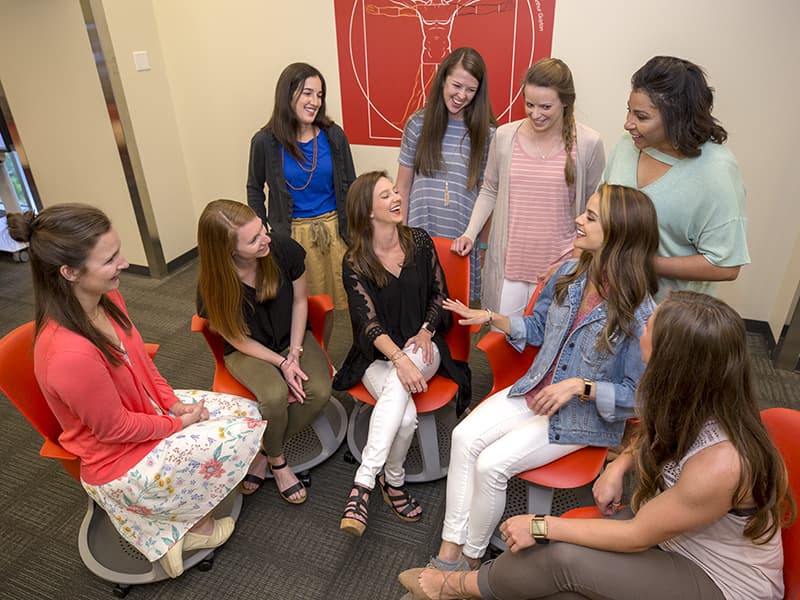
#UMMCGrad18: SHRP graduate overcomes rare genetic disorder to earn PT degree
Published on Wednesday, May 16, 2018
By: Bruce Coleman
When her name is called during the University of Mississippi Medical Center’s 62nd Commencement May 25, Alyse Green may be unable to walk up to the dean to accept her diploma.
But just like her journey through the School of Health Related Professions’ rigorous academic program, the physical therapy graduate will have plenty of support getting across the stage.
Five years ago, Green had never heard of Hyperkalemic Periodic Paralysis, the genetic disorder that now ravages her body daily, robbing her of the ability to move even her little finger for up to two hours every morning. It’s an extremely rare condition that is difficult for many to comprehend and nearly impossible for a person with an active lifestyle like Green’s to navigate.
“It’s a very hard thing for individuals to grasp,” said Green, a Meridian native. “How do you go from being paralyzed to walking around in a matter of a couple of hours? I live it every day, and it’s a hard thing to grasp.
“I’ve seen the doubt that others have in my ability, just from learning the diagnosis, and it can be frustrating.”
According to Genetics Home Reference, a publication of the National Institutes of Health, most people with Hyperkalemic Periodic Paralysis have increased levels of potassium in their blood during attacks of extreme muscle weakness or paralysis. The condition, caused by mutations in the SCN4A gene, is inherited and affects an estimated 1 in 200,000 people to varying degrees.
Between 9 and 10 each morning, Green’s muscles tighten and her body slips into a paralytic state, rendering her unable to move. She remains completely aware during these “episodes,” which can last until noon, but she can do little more than blink her eyes or sip through a straw.
“It’s a hard sensation to describe,” she said. “My muscles feel tight, but it’s not painful. Due to electrolyte imbalance, there is some associated nausea with it, but nothing overwhelming. It’s bearable.”
Bearable, perhaps, but inconvenient at best for a person about to embark on a professional career.
Active in gymnastics, dance, cheerleading and soccer as a child, Green experienced a few injuries in those sports and spent some time in physical therapy. She developed an interest in the allied health professions during middle school and decided to pursue degrees in athletic training and physical therapy.
While cheering for the University of West Alabama at Livingston, Green began to experience what she describes as “weird muscle cramps” in her legs and found it hard to stand up after practice. By the time she had finished her cheerleading career, she had begun to have trouble moving her limbs and knew something was very wrong.
When she began having weakness in her legs, trunk and arms, Green consulted a neurologist. Clinical and genetic testing revealed the condition. Green was bewildered by the news.
“I had never heard of it,” she said. “I don’t know anyone in my family who has this condition. My potassium level spikes so high during the day, it prevents my muscles from contracting, essentially causing a state of paralysis. All of the potassium runs out of the cells and into the bloodstream.”
Despite the diagnosis, Green managed to earn her degree in athletic training. To complete her lifelong objective, though, she needed to obtain a degree in physical therapy.
“I knew I wanted to stay in Mississippi and I had heard wonderful things about UMMC,” she said. “I had a few friends who went to school here and became physical therapists through the program here. That’s how I became interested in the school.”
She tried countless dietary and medicinal changes, but her condition progressed. She got the news she had been accepted into SHRP’s PT program while she was seeking treatment at the Mayo Clinic in Jacksonville, Florida.
Then doubt tried to creep in.
“My biggest question was, ‘Can I do it?’” she said. “All I got from the physicians there (at the Mayo Clinic) was, ‘We can’t tell you that you can, and we can’t tell you that you can’t.’ To me, that’s all I needed to hear.
“They didn’t tell me there was a medical reason not to go, so I made up my mind to just go. I followed the path I knew I wanted at an early age and didn’t let anything stop me.”
By the time she enrolled at UMMC in May 2015 – a mere five months after having received her diagnosis – Green was experiencing paralytic episodes more and more frequently. Having them at roughly the same time helped, but it did little to stem the anxiety that came with each episode.
“I was honestly terrified,” she said. “This was all still new to me. It was a new diagnosis and I was still learning daily how to deal with it, what works best.
“I honestly didn’t have much of a plan coming in (to UMMC) other than to talk to my professors and my new roommate on the first day that I got here.”
She found the physical therapy faculty were willing to make concessions for her condition – as long as she did the required work.

Dr. Lisa Barnes, associate professor and chair of physical therapy, calls Green “the bravest person I know.”
The physical therapy faculty “worked with her to coordinate what we need to do to support her in getting through this program,” said Barnes, who has served as an instructor for many of Green’s classes. “She is really quite a remarkable young lady. She has never complained, she has always done what she has needed to do and she has excelled.
“She has done the work and she has never made an excuse. If she needed to come in at 7 o’clock to sit in the professor’s office to take the exam, she did it with a smile on her face. She is a very bright young lady . . . and she is going to be an excellent physical therapist.”

“They (the faculty) were more receptive than I could have ever hoped,” Green said. “They allowed me to take tests either early in the morning or later in the afternoon. They were always available after lab times to let me practice and develop skills I was unable to during lab time.
“They were just always there with an open door to listen and to learn with me.”
As for her new roommate, “I was very concerned because I knew I couldn’t hide (the condition) from her very long,” Green said.
When Lauren Seal, a fellow physical therapy student from Bay St. Louis, initially added Green to her personal Facebook and Instagram accounts, she noticed something peculiar about her assigned roommate.
“I saw a picture where it looked like she had an IV,” Seal said. “I turned to my Mom and said, ‘I think my new roommate might be sick.’”
The night they moved into their apartment, Green took several hours to explain everything about her condition to Seal.

“I’ve never known anyone with anything like it,” Seal said. “You really don’t believe it until you see it. One minute, she can’t do anything for herself, then within minutes she can do everything for herself. It’s unlike anything I’ve ever read about or seen.
“I had no reservations (about rooming with Green). We just learned about it together. It felt like we were in it together.”
“She (Seal) has been an angel to me throughout the entire process,” Green said. She said the same could be said of her classmates.
“If there were any notes I needed, they got them for me. They stayed late to practice with me for the time I didn’t get during lab. They made sure I was transported from class to class. They’ve transferred me from chair to wheelchair countless times over the last few years.”
Barnes cites one specific example of that attentiveness: During their first year of PT school, the students visited the Mississippi State Capitol during Legislative Day.
“Her classmates picked her up, put her in the car, put her in a wheelchair and wheeled her into the state capitol building,” Barnes said. “From the students’ perspective, having her as a classmate has enhanced their experience. They’re going to school to be physical therapists and . . . they are able to see (firsthand) what it looks like when someone is completely paralyzed. They learned how to move her correctly, how to position her correctly when she can’t position herself.
“I can’t say enough about her classmates – they have been in complete support of her.”
Green echoed the sentiment: “I can honestly say if it were not for my classmates and the faculty, I would not have made it through PT school.”
Green said the greatest challenge of PT school was not having an able body at all times.
“Outside of an episode, I’m completely able to do anything you ask me to do,” she said. “It’s just during an episode that I’m not able to.”
She said that frustration has given her a valuable perspective on her profession.
“Something as simple as sitting in a chair for a couple of hours, not being able to move, and actually feeling how much pressure is on certain areas of your body, not being able to adjust,” she said, “to know there will be individuals I will be treating who spend their entire day like that, I feel like I have a lot of awareness of these aspects.”
For example, she said a common misconception some have about her condition is that she can’t feel anything when she is paralyzed.
“That’s just not true,” she said. “Knowing what it feels like and the frustration of not having an able body at times, I may only have a dose of what some patients feel, but I have that small sense of the struggle they may be feeling.”

Among her final, and largest, academic hurdles were the four clinical rotations she had to complete at physical therapy providers throughout the state. Not every facility was willing to accommodate her special circumstances, but those that were – Scott Regional Hospital in Morton, Total Rehab of Mississippi in Meridian, Rush Foundation Hospital in Meridian and Newton Rehab – quickly discovered she was an extremely capable – and experienced – student. One facility was so taken by her work that they extended Green a job opportunity.
“During my clinical rotation (at Total Rehab of Mississippi), I learned so much from the individuals at the facility,” she said. “As my eight weeks were coming to an end, the owner, Dr. Stephen Kay, said he would love to have me join them upon graduation. I immediately knew that was something I wanted to do.
“I went home and told my family, prayed about it and decided to take the position.”
Green’s success is no surprise to Seal.
“Alyse is an awesome person,” she said. “One of the things I found the most amazing about her from the beginning is her blind faith and acceptance that this was the hand she has been dealt. God gave her this for a reason. Alyse never felt sorry for herself.
“I learned a lot from her. She’s always just had such good faith. She’s very strong and she’s an inspiration.”
Which is why everyone has encouraged Green to participate in UMMC’s Commencement.
“I still have reservations about it,” she said. “I’ve been very determined throughout this process. I made up my mind very early I could cry about it or I could face it and move on with my life. I choose not to cry about it. There are days that are hard and frustrating, but I don’t feel the anxiety I once did. I’m more at peace with things now.
“After speaking with my faculty, friends, classmates and, most importantly, my family, I realize I deserve to be at graduation, whether I can walk across the stage or not.”

